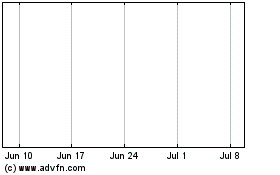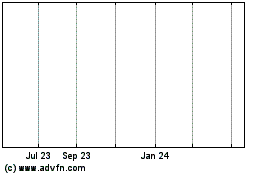By Timothy W. Martin and Na-young Kim
SEOUL--South Korea's Supreme Court struck down lower-court
decisions for cases involving Samsung's de facto leader and the
country's imprisoned ex-president, a ruling that exposes both to
more jail time for a bribery scandal that shook the nation.
On Thursday, the country's highest court sent back to appeals
courts the separate, though intertwined, cases of Lee Jae-yong, the
51-year-old grandson of Samsung's founder, and former President
Park Geun-hye, 67, the conservative daughter of a past dictator.
Both face a variety of charges, though the chief matter revolved
around the Samsung scion's bribes to Ms. Park.
The new appeals trials for both individuals are expected to
commence in the coming months. The 13 Supreme Court judges ruled
unanimously on Ms. Park's case. The decision on Mr. Lee passed by a
majority vote, with three justices dissenting.
The two cases are the most high-profile legal proceedings in an
influence-peddling scandal that rocked South Korea, starting in
late 2016. A populist backlash toppled Ms. Park's government.
The Supreme Court's decision injects new uncertainty over Mr.
Lee's future. He is the final decision maker at Samsung, one of the
world's largest business enterprises that spans dozens of
affiliates including consumer electronics and theme parks. Without
Mr. Lee's approval, key strategy moves and large acquisitions can't
proceed.
Mr. Lee doesn't face immediate imprisonment. His fate will be
determined by a forthcoming appeals trial that could reinstate, or
even alter, his original five-year prison sentence. A previous
appeals court ruling sprung him from prison after nearly a year
behind bars, reducing his five-year sentence to a suspended
sentence.
In the past, the appeals courts have tended to follow the
guidance provided by the Supreme Court, said Chang Young-soo, a law
professor at Korea University in Seoul.
"The possibility of Lee Jae-yong being imprisoned got much
higher for now," Mr. Chang said.
In February 2018, an appeals court reduced his prison term to a
suspended sentence after ruling that the bribes Mr. Lee was
convicted of paying shouldn't include the cost of three horses
Samsung provided to the daughter of a confidante of Ms. Park's.
The Supreme Court on Thursday disagreed with that viewpoint.
Chief Justice Kim Myeong-soo said the original ruling, which
considered the horses as bribes, was legitimate.
With the inclusion of the horses, Mr. Lee's bribes now add up to
8.6 billion South Korean won ($7.1 million)--a total surpassing a
threshold that by law requires at least a five-year sentence, which
can't be suspended. Mr. Lee's defense lawyers have sought to frame
the bribes, in part, as the result of coercion.
Samsung, in a post-hearing statement, vowed to be a responsible
corporate citizen and avoid repeating past mistakes. Mr. Lee has
led the conglomerate since 2014 when his father, Samsung Chairman
Lee Kun-hee, became incapacitated after suffering a stroke.
Neither the younger Mr. Lee nor Ms. Park attended the Thursday
afternoon hearing, held in a packed courtroom in southern Seoul.
Outside the court, protesters waved South Korean and American flags
and shouted chants urging for Ms. Park's release.
The Supreme Court also sent back Ms. Park's bribery case to
lower courts. She has been imprisoned for 2 1/2 years. A new
appeals trial will reconsider whether an extra year should be added
to her original prison sentence of 24 years, plus a fine that
totals about $16.5 million. The court ruled on Thursday that the
lower courts had sentenced Ms. Park improperly, by grouping charges
together that should have been handled as individual incidents.
Ms. Park, who in 2013 became the country's first female leader,
is one of four South Korean presidents to spend time behind bars.
She has been found guilty on a variety of charges including
bribery, disclosing state secrets and abuse of power.
The bribery scandal involving Ms. Park and Mr. Lee angered South
Koreans who organized mass protests lasting for months. They railed
against a system that had become all too familiar: the practice of
corporations funding government initiatives and expecting positive
treatment in return.
The suspected bribes flowed from the nation's biggest
conglomerates into foundations controlled by a confidante of Ms.
Park. The appeals court had tabulated Mr. Lee's bribes at 3.6
billion won. But that figure grew because the Supreme Court
factored in the cost of the three horses, plus other sports-related
payments made by Samsung.
The Supreme Court ruling focused on several meetings between Ms.
Park and Mr. Lee starting in late 2014.
Mr. Lee needed government support--including a swing vote by the
country's national pension--to seal a 2015 deal that would cement
his grip on Samsung Electronics, prosecutors said. Two Samsung
affiliates were merging, but foreign shareholders were vehemently
opposed.
Suh Bo-hack, a law professor at Kyung Hee University in Seoul,
applauded the Supreme Court decision for not being influenced, as
in past trials of business tycoons, by the role Mr. Lee could have
played in fortifying South Korea's economy at a challenging time.
Seoul is grappling with new Tokyo trade restrictions, while a
slowdown in global spending has hurt South Korea's export-heavy
economy.
"The judges only focused on the rule of law and common sense,"
Mr. Suh said. "Today's ruling will be an ideal example for all
future cases dealing with corruption between political and business
elites."
Eun-Young Jeong and Andrew Jeong contributed to this
article.
Write to Timothy W. Martin at timothy.martin@wsj.com
(END) Dow Jones Newswires
August 29, 2019 06:06 ET (10:06 GMT)
Copyright (c) 2019 Dow Jones & Company, Inc.
Samsung Electronics (PK) (USOTC:SSNHZ)
Historical Stock Chart
From Mar 2024 to Apr 2024

Samsung Electronics (PK) (USOTC:SSNHZ)
Historical Stock Chart
From Apr 2023 to Apr 2024
